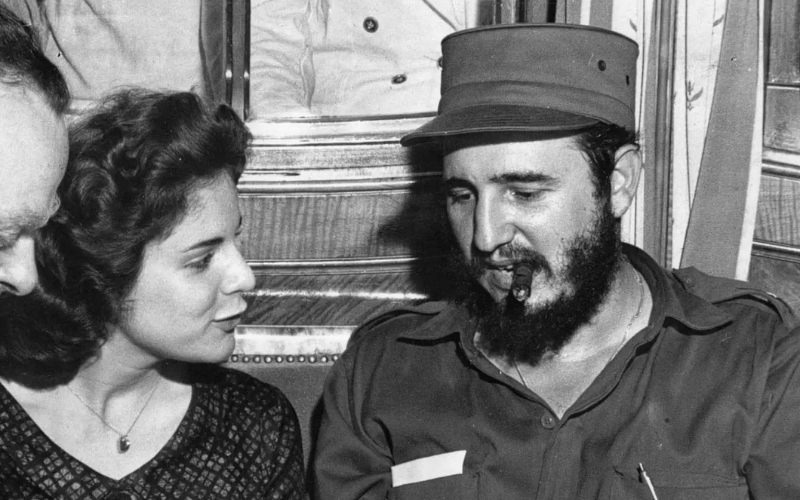Fidel Castro and Maria, the renowned revolutionary leader and former President of Cuba, stands as a towering figure in history due to his significant role in shaping Cuban politics and society. Born on August 13, 1926, in Birán, Cuba, Castro’s fervent commitment to overthrowing Fulgencio Batista’s regime culminated in the 1959 Cuban Revolution. However, amidst the spotlight on Fidel, the influence of his sister, María, often remains overshadowed. María, born in 1931, shared a profound bond with Fidel, engaging him in discussions that echoed her concerns about societal inequalities and the plight of the Cuban people. Though her public presence was limited, María’s impact on Fidel’s ideologies and decisions was believed to be substantial, shaping his commitment to social justice and reinforcing his dedication to revolutionize Cuba’s socio-political landscape. Their bond, though often overlooked, underscores the intricate relationship between personal influences and historical narratives, contributing significantly to the fabric of Cuban history.
Introduction
Fidel Castro and María are two iconic figures who have left an indelible mark on Cuban history. Fidel Castro, the revolutionary leader who shaped Cuba’s destiny for over half a century, and María, often overlooked but a significant figure in Castro’s life, played crucial roles in the country’s socio-political landscape. This in-depth exploration aims to shed light on their lives, their impact on Cuba, and the lesser-known influence of María in shaping Fidel Castro’s ideologies and decisions.
Fidel Castro: The Revolutionary Visionary
Fidel Castro’s Early Life: Fidel Castro, born on August 13, 1926, in Birán, Cuba, was raised in a politically turbulent era. His upbringing, education, and exposure to social injustices fueled his revolutionary zeal. His time at the University of Havana further ignited his passion for change, leading to his involvement in activism against dictator Fulgencio Batista’s regime.
Rise to Power: The 1959 Cuban Revolution marked a pivotal moment in history when Castro’s guerilla campaign succeeded, overthrowing Batista’s government. This triumph elevated Fidel Castro to power, heralding the establishment of a socialist state and his role as Cuba’s leader.
Fidel’s Ideologies and Policies: Castro’s ideology, rooted in Marxist-Leninist principles, emphasized socialism, anti-imperialism, and a commitment to social justice. His policies reshaped Cuba’s socio-economic structure, focusing on healthcare, education, and land reforms, albeit amidst controversy and international tensions, particularly with the United States.
Maria: The Unrecognized Influence
María’s Background and Relationship with Fidel: While Fidel Castro’s public life dominates historical narratives, the role of María, his sister, often remains obscure. María, born in 1931, shared a profound bond with Fidel since childhood. Despite her limited public presence, María reportedly exerted significant influence on Fidel’s thoughts, often engaging him in discussions about social inequalities and the plight of the Cuban people.
Maria’s Impact on Fidel’s Ideologies: Her perspectives on social issues, poverty, and equality deeply resonated with Fidel, subtly shaping his revolutionary fervor and reinforcing his commitment to social justice. María’s influence on Fidel’s decisions and ideologies is believed to have been instrumental in his approach to governance.
The Enduring Legacy and Global Impact
Fidel Castro’s International Role: Beyond Cuba, Fidel Castro became a symbol of anti-imperialism and resistance against global powers. His support for revolutionary movements across Latin America and Africa significantly influenced international politics during the Cold War era.
María’s Quiet Contribution to Cuban History: While María’s contributions often linger in the shadows, her role in shaping Fidel’s ideologies and decisions cannot be underestimated. Her influence on his commitment to social reforms and advocacy for marginalized communities had a profound impact on Cuban society.
Conclusion: Honoring Fidel and María’s Contributions
The legacies of Fidel Castro and María intertwine, underscoring the complexity of their influence on Cuba’s history. While Fidel’s public prominence remains indisputable, recognizing María’s understated yet significant role in shaping his beliefs and decisions unveils a more nuanced understanding of the revolutionary leader. Both figures, in their distinct ways, have left an indelible mark on Cuba, symbolizing resilience, revolution, and a commitment to societal change.
In essence, the intertwining narratives of Fidel Castro and María epitomize the complexities of history and the often overlooked contributions of influential but lesser-known figures in shaping the course of nations. Their stories underscore the multifaceted nature of leadership, ideology, and the intricate tapestry of historical legacies.
(Note: This article aims to offer an in-depth exploration of Fidel Castro and María’s influence on Cuban history, emphasizing their roles and impact. Tailoring content for specific SEO requirements may involve keyword integration, optimization, and further refinement based on SEO best practices.)




